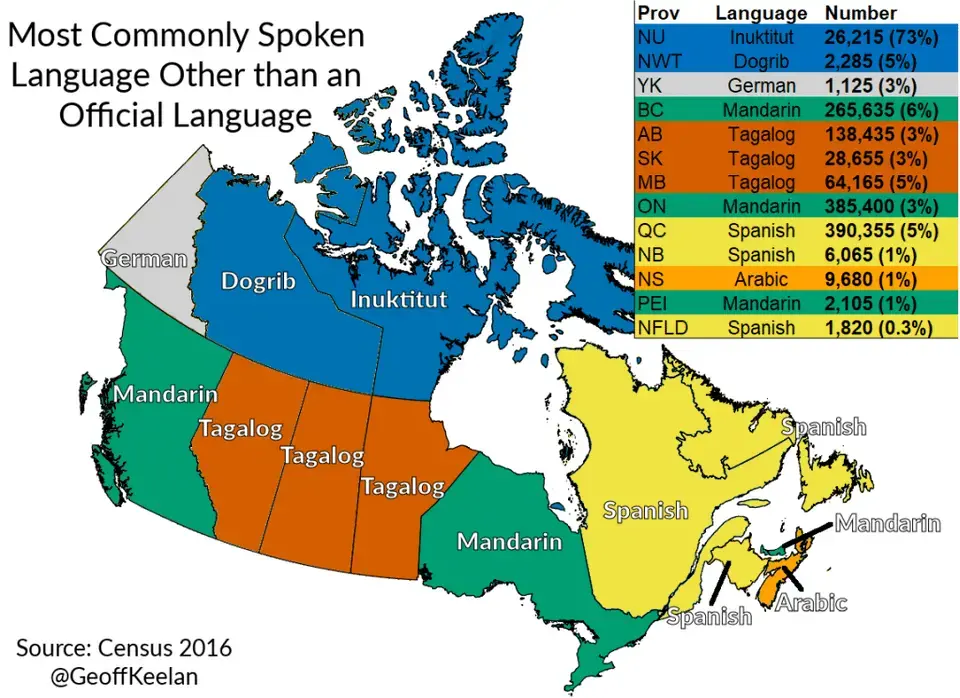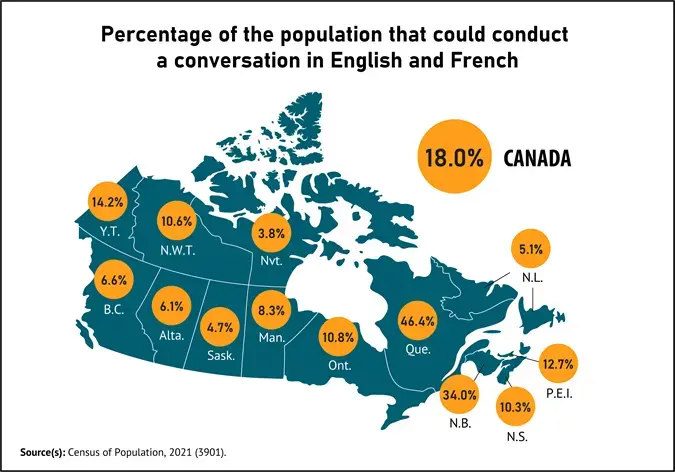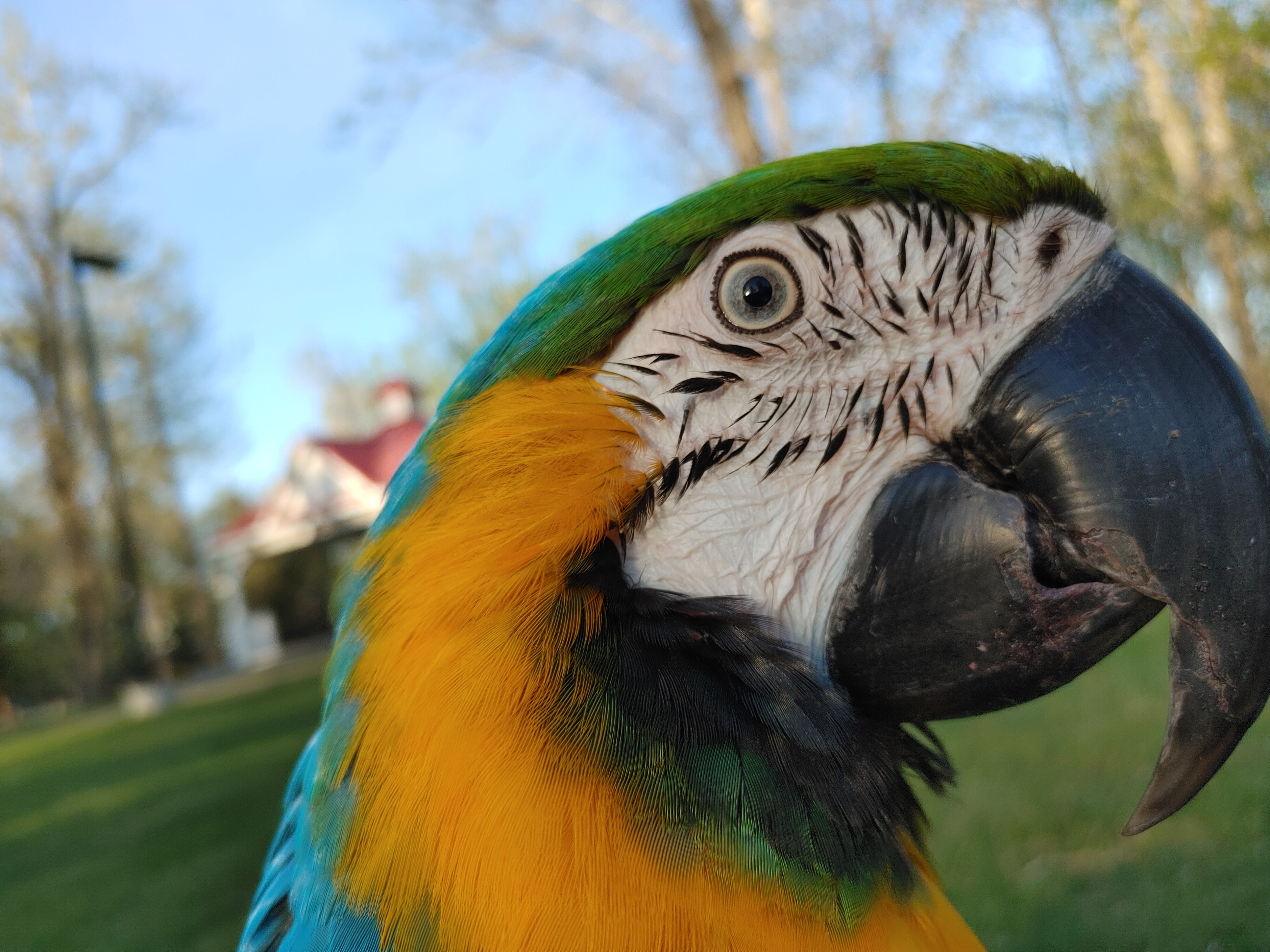I was very lucky growing up, and my little middle school in my little village in Nova Scotia offered French Immersion (late, started grade 7).
Sure, some of my teachers were anglophone, but the rest were Acadian. When I went to university I didn’t think much about it, but soon discovered that I was functionally and operationally bilingual. I continued to study French at university where all of my teachers happend to be from la belle province and graduated.
Now I’m a professor in France. I’ve been doing this for about 17 years. My students greatly underestimate their level in English, yet here I am correcting 750-word essays written by 1st year students who have only “studied” English for an hour or two a week since middle school. Are they good? Meh… But they are better than they imagine.
Canada is supposed to be bilingual. I’ve seen different numbers fly around over the years regarding the percentage of bilingual Canadians. How about you, are you bilingual? How bilingual?
Addendum:
These maps are not directly related to the question, but I came across them while looking things up.
This is from 2016. I like showing this to my students. They always ask me why I bothered learning French.

And this is from 2021 and is a little bit related to my question, but only covers English and French.

How about you, are you bilingual? How bilingual?
Very, it’s just that French isn’t my other language. As with so many other immigrants, English isn’t my first language. In my case, it is the third one.
And given the amount of work I know it takes to master foreign language, I’m not in a hurry to add a fifth such as French.
Same here … except my language is Indigenous … my first language is Ojibwe-Cree which both my parents spoke and English was our second language. For the first ten years of my life I only spoke my language and English was a foreign language.
As an adult that’s only used English now for most of my life it’s the other way around … I now speak more English than Ojibwe because there’s only a few hundred people that still speak my language and my specific dialect.
I’m still fluent in my first language … I just don’t have anyone to speak to.
Thanks for sharing your story. As distant as our background is, I have the same problem of not really having anybody with whom to practice my native language on a regular basis.
On the other hand I’m grateful to all the people who have put the effort to learn English, giving people like me a chance to learn something from them, which wouldn’t happen otherwise.
Hang tight on it.
Meet people online or provide online classes, or recorded classes that can last for generations.
That counts!
I’ve completed the CCC test working for the federal government earlier this year. So in theory I am totally bilingual.
That being said, whenever any francophone hears my Anglo accent, they switch to English “for me”, meaning I can never just practice like I did when I was preparing for my tests at work.
I actually had my first positive franco-interaction in the wild just last month. Like a full interaction with a random person where they never switched to English after hearing my accent.
I was in Chelsea after hiking in Gatineau park, and someone pulled up their car next to me and asked me where a certain street was, and I told them “sorry, I don’t know, I’m not from around here”. It’s a small thing, but it felt good knowing it was the first time that had happened.
As someone from the GTA, I can tell you that no amount of mandatory French class will make you bilingual if you aren’t using it outside of that class or are in an immersion program. I took French all the way through grade 12 but I can barely hold a conversation now because I’ve had no reason to use it since.
I’m from B.C. and only grade 7 is mandatory so that’s all I took. Outside of that class, French was nonexistent and was a huge reason I didn’t care about it. I regret not sticking it out, especially now that I live in a French community in Ontario.
Also in BC. Similar experience. My eldest daughter was in French Immersion though, and it’s served her well. As for myself, I have my high-school French, but also naika tenas kumtuks Chinuk wawa.
12 day streak in Spanish on Duolingo. So getting there!
Good luck!
Nice!
Bien!
I grew up in Alberta and was forced to take french from grades 1-6 and I believe it was an option from grade 7 onward. Most of my french teachers sucked at teaching, didn’t know the language that well, or just didn’t care. I know my french sucks and I can hardly string a few words together, however I can understand a lot more when spoken to me, and I can figure out 70% while reading it. Just don’t ask me to wright in french.
However I drove across Canada this summer and I apparently know enough to get fuel while in Quebec!
… Just don’t ask me to “wright” in french 😭😭😭🤐😶🌫️
i blame voice to text, even tho i didnt use it
😂
deleted by creator
I’m from Québec and fluent in both French and English (spoken and written).
I went through an exclusively French curriculum (with interspersed English and Spanish classes in both high school and cegep). University was mostly in English.
At home, we spoke mostly in 2 other languages (still speak well enough but unfortunately I never learned to write in) with both sides of the family, with English as a go between when needed.
I was nowhere any good in any of my language classes, frequently zeroes (out of 10 or 100) in written quizzes and tests (I tended to write phonetically). I don’t know how I (barely) passed without ever failing a single class 🤣. I am better now, probably out of lifelong practice.
I was way better, if not excellent, in mathematics, physics, chemistry and most sciences in general.
What probably helped was my continuous daily immersion in both French and English with friends, family, coworkers, colleagues, clients, neighbors and also through shows, movies, music, books, journals, contracts and various projects.
Although, nowadays, I personnaly feel (false impression perhaps) like my English vocabulary is vastly larger than my French one.
Northern Ontario. Fully fluent in French and English, written, spoken, and between the lines. French Catholic schooling. French at home and at work. I realize I am the exception.
I agree with other comments on here, like many other skills, if you don’t use it everyday that skill will rust over time.
Here’s poster that shows French language schools across Canada. It is rather dated but it may somewhat answer the question.

I haven’t spoken French very much since I was in my teens, but I’m still fluent and sound like a native speaker (although in a way that would give the Académie Française fits). My hometown in Ontario is 3/4 Francophone, and I attended a French (not immersion) school until I was 13, although my family background is Anglophone. I don’t recommend that as a strategy, though—I had a difficult time for the first couple of years.
20 no-French years since college and whatever french I had is gone. Helped in the army, though, as in the west the sargeants assume everyone’s anglo scum.
In my 30s, took 12 years of french immersion and retained almost none of it :/
I also had a hard time with english so it’s not like I was picking sides, some people just suck at languages and I am one of them.
deleted by creator
That two charts have nothing to do with each other.
The first is (English or French) + (any language that is not English or French).
The second is English + French.As someone who did french immersion the whole way through, I can say it was honestly a waste of effort for me despite being completely fluent. Unless you live somewhere that French is used, it’s not really a common language. I mostly use it to laugh at poorly translated documents, or I can grab the French instructions of a new board game while someone else can read the English.
If you want to learn another language in the same group as English, learn Spanish.
If you just want to learn another language, look at where people in your area are from and learn one of those. Urdu, Tagalog, or Arabic might be a better choice.Yep, I know how
chartsmaps work. I didn’t say they were related. I couldn’t find anything similar to the 2016 map so I threw in something related to the question I was asking. Thanks for pointing that out, I’ll add a little note to my post.It is great that you’re fluent. Barely anyone in my cohort/graduating class kept up their French, and the students that did core French might have known a decent collection of phrases and useful vocabulary.
I’m fairly fluent, and took early French immersion in school growing up. That gave me a good foundation, but like a lot of others said, I didn’t use it after school, and lost a lot of ground.
I made a serious effort in my late 20s/early 30s to try and get better (I do really like the French language), and I would say I’m passable in conversation, but I start falling apart after about 10 minutes. Reading I’d say I’m fluent, but I read a slowly. I still have a lot of trouble with writing.





